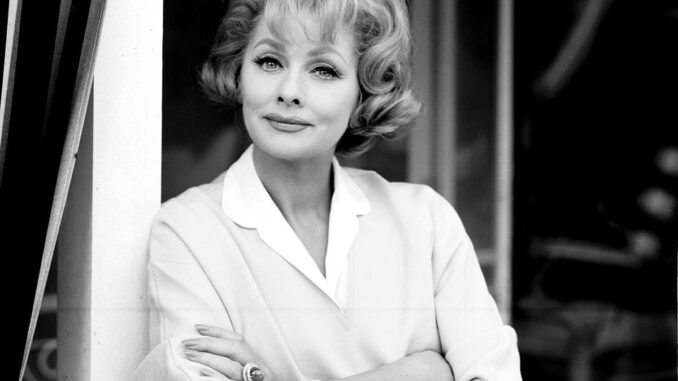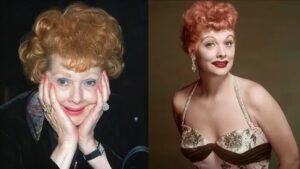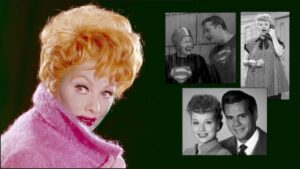
Unleashing Lucy’s Magic: Lucille Ball’s Unspoken Authority and the Captivating Rules of the ‘I Love Lucy’ Cast
When we think of I Love Lucy, we remember the belly laughs, the iconic slapstick moments, and, of course, Lucille Ball’s dazzling comedic brilliance. But behind the scenes, something even more powerful was at play. Lucille Ball wasn’t just the star of the show — she was its backbone, its silent authority. While Desi Arnaz may have had the title of executive producer, Lucy wielded a unique kind of influence that often went unspoken. So, how did she pull it off, and what were the unseen rules that governed one of the most beloved TV casts of all time?
The Queen of Comedy: Lucille Ball’s Influence
Lucille Ball wasn’t just another actress; she was a trailblazer. Her talent and work ethic were undeniable, but what made her truly stand out was the way she commanded respect, both on and off the screen. While many recognized her as the goofy redhead who got into all sorts of antics, those close to her knew she was a perfectionist who pushed everyone around her to perform at their best.
The Rise of Lucille Ball: A Story Beyond Comedy

Lucille’s journey to the top wasn’t paved with glitter. Before she became the face of comedy, Lucille worked tirelessly in Hollywood, taking on a variety of roles that didn’t quite fit her comedic genius. But every step she took added to her understanding of show business, and when I Love Lucy was born, she was more than ready to take charge.
Desi Arnaz: The Producer, but Lucy’s Vision
While Desi Arnaz was often credited with the technical innovations of I Love Lucy — including the pioneering use of the multi-camera setup — it was Lucille who had the final say in creative decisions. Their marriage may have been turbulent, but their professional partnership was something else entirely. Lucille knew comedy better than anyone, and Desi trusted her instincts on what would work.
The Unspoken Rule: Lucille Ball Had the Final Word
When it came to casting, scripts, and on-screen chemistry, Lucille had an unchallenged influence. Her ability to read the room and understand what would resonate with audiences was key. The cast knew when Lucy liked something — it stayed, and if she didn’t, it got scrapped.
Lucille’s Unofficial Role as Director
Though I Love Lucy had credited directors, Lucille Ball often stepped into the role without the title. She had an uncanny ability to know when a scene needed tweaking or when a joke would fall flat. Her comedic timing wasn’t just something she brought to her own character, but something she infused into the entire show.
Tight-Knit Cast Dynamics: More Than Just Co-Workers

The chemistry between the I Love Lucy cast wasn’t just for the cameras. Lucille had a way of making her fellow actors feel like they were part of something bigger. There was a family-like dynamic on set, one where everyone knew their role but also knew that Lucy was the glue holding everything together.
Vivian Vance and William Frawley: The Love-Hate Relationship
Vivian Vance (Ethel Mertz) and William Frawley (Fred Mertz) had their share of behind-the-scenes tensions, but Lucille Ball’s authority helped keep the peace. She had a unique way of navigating personalities, ensuring that no matter what happened off-screen, the show ran smoothly on-screen.
Lucille’s Relentless Pursuit of Perfection
Lucy had a reputation for being tough. She demanded rehearsals until things were perfect and wasn’t afraid to scrap entire scenes if they didn’t live up to her standards. Some might have seen her as controlling, but in truth, she knew exactly what made audiences tick, and she was determined to deliver every single time.
The Impact of Lucille Ball on Women in Television
Lucille wasn’t just breaking barriers for herself; she was paving the way for women in television. At a time when men dominated Hollywood, Lucille’s role as both the star and creative force behind I Love Lucy was groundbreaking. She showed that women could not only lead but also steer the direction of an entire production.
Lucille’s Hands-On Approach with the Scripts
Lucille didn’t just memorize her lines — she dissected them. If a joke didn’t land or if the dialogue didn’t feel natural, she’d rework it until it was perfect. She collaborated closely with writers, ensuring that the humor in I Love Lucy was sharp, relatable, and timeless.
How Lucille Ball Changed the TV Landscape
Lucille’s influence extended far beyond the walls of the I Love Lucy set. She and Desi created Desilu Productions, a company that would go on to produce iconic shows like Star Trek and Mission: Impossible. Without Lucille’s trailblazing efforts, the TV industry as we know it might look very different today.
The Power of Physical Comedy
One of Lucille’s most enduring legacies is her mastery of physical comedy. Her expressions, movements, and timing were impeccable, setting a standard that few have been able to replicate. But this wasn’t accidental. Lucille worked hard to perfect every fall, every stumble, and every exaggerated look. It’s no wonder she became a comedic icon.
The Magic Behind the Laughs
The laughter you hear on I Love Lucy was real, thanks to a live studio audience. This added pressure for the actors, but Lucille thrived on it. She knew how to work a crowd, and her ability to feed off their energy made the show even more dynamic.
Legacy That Transcends Generations
Even decades after its original run, I Love Lucy continues to captivate audiences. Lucille Ball’s influence on modern comedy is undeniable, with countless comedians and actors citing her as their inspiration. But more than her on-screen talent, it was her behind-the-scenes power that set her apart as a true television pioneer.
The Unspoken Rules of Respect for Lucille
Cast and crew alike had an unspoken respect for Lucille’s authority. She had earned her place at the top, and everyone knew it. Her keen sense of what worked and her tireless work ethic weren’t just appreciated — they were revered.
Conclusion: The Magic of Lucille Ball Lives On
Lucille Ball’s magic didn’t just lie in her ability to make us laugh. It was in her unwavering vision, her unrelenting pursuit of excellence, and her ability to lead without ever needing to say she was in charge. Through her unspoken authority, Lucille crafted a show that wasn’t just a hit — it was a revolution. And while I Love Lucy may have ended its run, the influence of Lucille Ball continues to shape the world of television today.